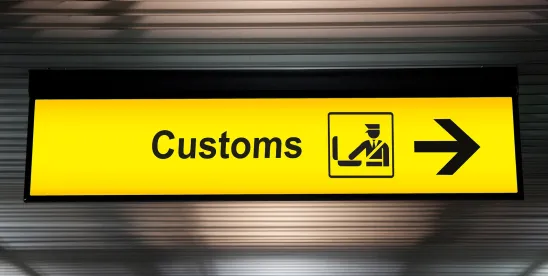Our previous article on What Every Multinational Company Should Know About … Customs Enforcement and False Claims Act Risks (Part I) outlined how import-related risks have substantially increased given the combination of the new high-tariff environment, the heightened ability of Customs (and the general public) to data mine import-related data, and the Department of Justice’s (DOJ) stated focus on using the False Claims Act (FCA). In Part II, we laid out how to prepare for the most common False Claims Act (FCA) risks arising from submitting false Form 7501 entry summary information. We now complete the series on “Customs Enforcement and False Claims Act Risks” with Part III, which focuses on preparing for the most common FCA risks arising from improper management of import operations.
Risks Arising from Knowing Failures to Correct Errors
If importers discover a systematic error, the position of Customs is clear: The importer is under an obligation not only to correct the error for future entries but also to use measures like post-summary corrections to update prior entries. This is demonstrated by a DOJ settlement in which an importer paid over $22 million to settle allegations that it “made no effort to right its wrongs even after acknowledging internally that it had underpaid millions of dollars of duties owed.” This type of knowing error is exactly the type of conduct that can expose importers to reverse FCA liability.
Customs Compliance Response
- Apply Current Knowledge to Unliquidated Entries. Because liquidation takes (approximately) 314 days after entry, Customs grants a 300-day post-summary corrections period to correct most entry-related information. If you discover an error, Customs requires not only that the error be corrected going forward but also that any non-liquidated entries be corrected as well.
- Consider Making a Voluntary Prior Disclosure. If an importer initiates a voluntary disclosure before Customs begins its own investigation, then Customs may not pursue penalties, assuming the voluntary disclosure is full and accurate, and the importer pays back any tariffs and interest due. This is an especially important advantage for the new Trump tariffs, since many of them direct that Customs should impose maximum penalties for failure to pay all of the new tariffs, without taking into account traditional Customs mitigating factors. Filing a voluntary self-disclosure before Customs initiates an administrative investigation avoids any Customs administrative penalties (provided the importer follows through with a thorough and accurate disclosure). While a self-disclosure is not a free pass to avoid FCA liability, it can reduce the multiplier and penalties assessed in settlement negotiations.
Risks from Failing to Follow Form 28 and 29 Corrections for Prior Entries
Customs commonly issues Form 28 Requests for Information and Form 29 Notices of Action that target a handful of entries (or even a single entry) where it has questions about the accuracy of submitted entry information. If this results in Customs issuing a correction, then the importer is required to correct not only the entry but also any other entries covered by the reasoning. Failure to do so was one of the key elements of the $22.8 million settlement noted above, where DOJ emphasized that although the importer had received Form 29 Notices of Action, it took two years to correct its ongoing entries (and never corrected prior entries).
Customs Compliance Response
- Set Up ACE Notifications. Importers should set themselves up with ACE access so that they directly are receiving copies of Form 28 Requests for Information, Form 29 Notices of Action, and other communications from Customs rather than relying on customs brokers to provide such information. This will ensure that the importer is aware of all potential corrections to its Form 7501 Entry Summary information and can timely respond to any Customs inquiries.
- Follow Through on Implementing Conforming Changes. When Customs issues a correction to a single entry or set of entries, the importer is required to identify all analogous entries and correct them for any unliquidated entries, because they are not final. Customs also has the authority to open an inquiry into liquidated entries under Section 1592 if the importer does not file a voluntary disclosure.
Risks Arising from Failure to Notice Red Flags from Suppliers
Under Customs regulations, the importer of record has the sole responsibility to pay all tariffs due. There is, however, no such restriction under the FCA, which means that multinationals that receive imported goods from suppliers can still be liable for FCA claims. For example, an importer of garments from China paid $1 million to settle allegations that it “repeatedly ignored warning signs that its business partner, which imported garments from China, was engaged in a scheme to underpay customs duties owed on the imported garments it sold to” the importer. Thus, even though the customer was not the importer of record, it settled on the basis it had accepted “responsibility for its failure to take action in response to multiple warning signs that [the importers of record] were undervaluing their imported goods and therefore paying less in import duties than they should have been paying.”
Moreover, in 2016, both the importer and manufacturer of clothing goods agreed to pay $13.375 million to settle claims that they conspired to underpay customs duties using invoices that misrepresented the value of the goods at issue. That same year, a U.S. defense contractor agreed to pay $6 million to settle allegations that it used Chinese-imported ultrafine magnesium in flares manufactured and sold to the U.S. Army, in violation of its contract with the military. Though it was the importer who allegedly misrepresented the country of origin, DOJ alleged that the contractor conspired with the importer to sell the nonconforming goods to the government.
Customs Compliance Response
- Monitor Business Partners for Red Flags. In a high-tariff environment, there are more incentives than ever for importers to take steps to try to minimize their tariff liabilities. Educate personnel in Procurement, Accounting, and other relevant areas of the company to be alert to potential underpayments by suppliers, which also is useful for situations where business partners might provide incorrect information where your company acts as the importer of record. Simply put, know your business partners well.
Risks Arising From Avoiding Customs Penalties
In general, any situation in which an importer takes steps to avoid Customs penalties can lead to a potential FCA penalty. Examples include failing to mark the country of origin (10% Customs penalty), providing false or misleading information on entry documents (as we covered in Part II), failing to maintain required records, or noncompliance with forced labor regulations. By way of example, the Third Circuit found that failure to notify Customs of marking violations can support an FCA allegation. 839 F.3d 242 (3rd Cir. 2016), cert. denied, 138 S.Ct. 107 (2017). Illustrating this risk, an importer paid $765,000 to settle allegations that it had failed to mark imported pharmaceutical products with the appropriate COO and thus violated the FCA by “knowingly avoiding the marking duties owed to the United States for those imports.”
Another example includes a $1.9 million DOJ settlement in which an importer agreed to settle allegations that it falsely labeled tools it imported as “made in Germany” when the tools were, in fact, made in China. According to DOJ, if the products had been described as Chinese products, the importer would have been required to pay a 25% tariff on the goods. Thus, by allegedly falsely describing the tools as “German,” the importer avoided paying these tariffs.
Customs Compliance Response
- Confirm Consistent Marking. Ensure the COO for marking decisions is made in accordance with the correct legal regime, by following the rules of free trade agreements like the USMCA (even in situations where special tariffs may require the use of substantial transformation principles for determining the amount of other tariffs due). Ensure marking is made either directly on the product or, where allowed, on a relevant container or other acceptable fashion to ensure it remains intact for the ultimate purchaser.
- Maintain Required Records. Customs regulations require that, subject to certain exceptions, records must be kept for five years from the date of the activity which required creation of the record. Importers should ensure that they are complying with Customs recordkeeping requirements and that their employees are familiar with recordkeeping requirements. The FCA also requires that documents supporting claims — and the claims documentation itself — be true and accurate.
- Conduct a Supply Chain Integrity Check and Continuous Monitoring. Complying with labor and transparency requirements is integral to tariff management. Importers should know every step in their supply chains and conduct integrity checks or audits of their suppliers. This can help ensure your company stays informed of new developments to comply with laws — especially in the areas of forced labor, human trafficking, environmental regulations, and modern slavery — and thus avoid potential FCA liability pertaining to these types of regulations. Importers also should implement systems to regularly monitor their suppliers’ performance and compliance, and continuously evaluate their supply chain for new potential risks that might arise. For further guidance on how to best monitor your supply chain, check out our white paper on Managing Supply Chain Integrity Risks.
Between the new Trump tariffs, increased Customs attention to tariff underpayments, newly announced DOJ emphasis on tariff payments, and the greater visibility of Customs into importing data, the potential for Customs FCA actions is greater than ever. As demonstrated throughout this three-part series, DOJ has a rich history of using a wide variety of issues to support FCA actions. DOJ’s announced attention to concentrate on Customs compliance and the full payment of tariffs means that future customs-related FCA cases will build on a foundation of existing cases. These previous cases have already given DOJ and whistleblowers the chance to test out a multitude of the factual and legal theories discussed throughout this series, with both DOJ and relators likely to be incentivized by the potential for significantly higher recoveries and the apparent increased enforcement flexibility resulting from the new tariff regime.
Thus, under the Trump administration’s trade agenda, multinationals should expect heightened scrutiny of imports and DOJ’s increased use of the FCA to bring customs-related actions. It is therefore more critical than ever for importers to assess and revamp their Customs compliance programs to address these new risks. Proactively addressing compliance issues, strengthening internal controls, and documenting decision-making processes can reduce exposure and better position multinationals to respond effectively if Customs scrutiny arises. In an environment with increased potential for enforcement and where corresponding penalties are steep, early preparation is both a risk management strategy and a competitive advantage.








 />i
/>i
